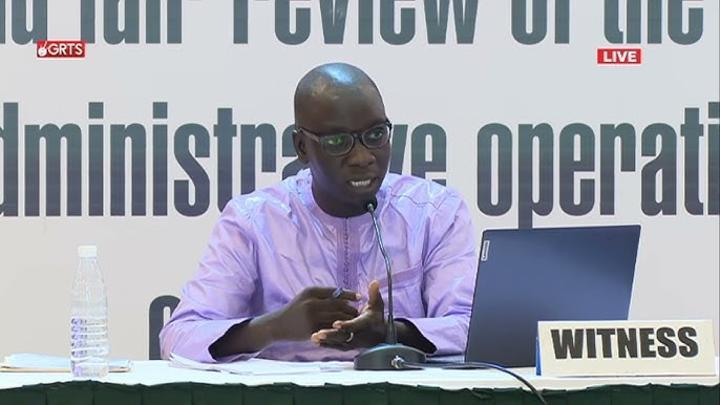Africa-Press – Gambia. Modou Jonga, the former Chief Executive Officer (CEO) of the Brikama Area Council (BAC), faced tough questioning over the sale of council vehicles during a 2020 auction, amid evidence suggesting several vehicles were sold below their evaluated prices.
Appearing before the commission of inquiry, Jonga was informed that a vehicle registered as BAC 4 had been valued at D40,000 by the evaluator, but was ultimately sold for only D10,000.
“That is what I am saying; some of these vehicles are sold at a lesser price,” lead counsel Patrick Gomez stated.
While Jonga acknowledged the discrepancy, he argued that in other cases, some vehicles sold for more than their evaluated value. He cited an example of a vehicle valued at D60,000 that fetched double that amount at auction. However, Counsel Gomez made it clear that the commission’s focus was on irregularities, not exceptions.
“If the evaluation report said this should be the amount, so why would it be sold at a lesser price?” Gomez pressed.
Jonga responded that he could not offer a satisfactory explanation at that time.
Gomez then informed the former CEO that the commission had received an official auction report addressed to his office. According to that report, the total expected revenue from the auction was D1,229,600. However, only D1,126,100 was generated, leaving a shortfall of D103,500 as of January 28, 2020.
Jonga, however, insisted that the projected revenue from the auction had initially been D545,000, not over a million dalasis. “That is the figure we were working with,” he said.
Counsel Gomez refuted this, citing the official summary report addressed to Jonga’s office, which clearly stated the expected amount was D1.2 million. Jonga maintained that while he was not disputing the actual amount raised, the D545,000 figure had been referenced in an internal investigation report.
When asked whether he had been properly advised on the condition of the vehicles before they were auctioned, Jonga said he understood that the vehicles were unroadworthy.
“Why did you say the expected amount was half a million Dalasi. In the report it is stated that the expected amount would be one million two hundred and twenty-nine thousand six hundred dalasis,” Counsel Gomez pointed out.
Jonga told the counsel Gomez that the figures he provided reflected what the council had received from the vehicle auction.
However, the counsel disagreed, stating that according to the auction summary report addressed to Jonga, a total of D1.1 million had been generated as of January 28, 2029.
In response, Jonga clarified that he did not dispute the D1.1 million figure as the actual revenue generated. However, he pointed out that the investigation report indicated the expected value was five hundred and forty-five thousand dalasis.
When asked whether he had received proper advice regarding the condition of the vehicles, prior to the auction, Jonga acknowledged that he was aware the vehicles were not roadworthy.
“How do you know that. What informed your decision,” Counsel Gomez pressed.
Jonga explained that a committee had been established to oversee the auction process, and that the decision to auction certain vehicles and scrap materials was based on the committee’s findings.
Lead Counsel Gomez inquired whether Jonga had access to a complete evaluation report for each item put up for auction, noting that the commission currently only has a partial report on file.
In response, the witness acknowledged that the report should have been more detailed and comprehensive.
Counsel Gomez further clarified that, under GPPA regulations, any decision to auction council property must be guided by specific criteria that the Chief Executive Officer is required to consider before proceeding. “to make the decision to subject council’s property to auction the GPPA regulation clearly outlines what the CEO must factor in taking that decision,” he explained.
He was further questioned on why the GPPA regulations were not adhered to.
In response, witness Jonga admitted that while an assessment was conducted, it was insufficient. “It should have stated the current conditions of each of the vehicles which was absent,” he said.
Counsel Gomez informed the witness that if a requirement is not adequately fulfilled in accordance with the law, it is effectively equivalent to it not being fulfilled at all. The witness agreed, acknowledging that the report in question should have been more comprehensive.
He further stated that the omission may have been an oversight, but noted that the process did not end there, as they went on to engage the Gambia Public Procurement Authority (GPPA).
For More News And Analysis About Gambia Follow Africa-Press






